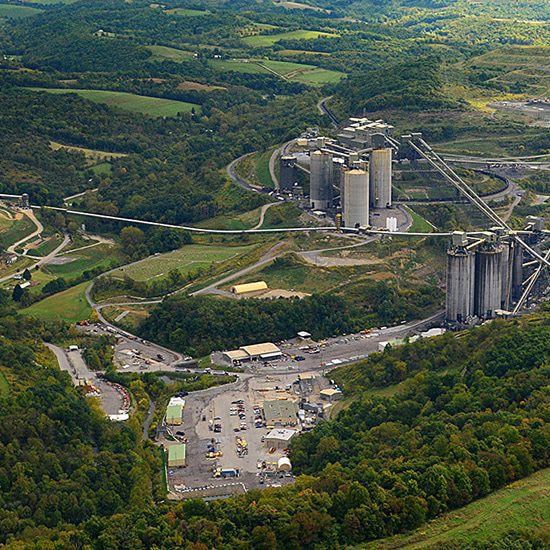Operating with Ethics and Integrity
A Proud History of Responsibility
Since the origins of our company in 1860 and our first active mining operations in 1864, CONSOL has powered the nation with affordable, redundant, reliable domestic energy. Today, CONSOL’s employees help generate the fuel that accounts for nearly one-third of the nation’s power supply. Our energy supports the American way of life by helping deliver electricity 24/7/365, while creating family-sustaining jobs and keeping our nation competitive in the global marketplace.
CONSOL Energy’s coal mines are highly technical operating environments that require specialized training. Our strong record on safety and environmental stewardship, as well as our commitment to the communities where we have lived and worked for generations, has helped enable us to become the accomplished energy company we are today. Our core values – Safety, Compliance and Continuous Improvement – are the foundational elements and guiding principals of our business model and distinguish us from our peers.

CONSOL Energy through the Years
Built on our proud history, CONSOL Energy strived each and every day to be the safest and most respected energy producers in the world, now and into the future.
Management Team
Corporate Governance
Our Strong Commitment To Corporate Governance
CONSOL Energy's Board of Directors and management team believe that corporate governance goes hand in hand with strong financial performance. Plus, we firmly believe that sound principles of corporate governance are essential in making good decisions on behalf of our shareholders, employees and other stakeholders.
Our Board of Directors regularly reviews out governance policies to ensure that we are in compliance with applicable laws and regulations, as well as best practices. On the following pages, you can find our corporate governance documents, including our Corporate Governance Guidelines, Related Person Transaction Policy Code of Business Conduct and Ethics, and Charters for each of our Board Committees.
Corporate Governance Principles
CONSOL Energy’s Board of Directors operates in accordance with these principles and corporate governance processes:
- After an initial period with a classified board, CONSOL Energy will hold an annual election of directors. Any investment director who recieves a greator number of votes "withheld" from his or her election those votes "for" his or her election must submit an offer of resignation to the Board.
- At least a majority of the Board must be independent.
- The Audit, Compensation and Nominating and Corporate Governance Committees of the Board are required to be composed entirely of independent directors.
- The Board has the authority to hire independent advisors.
- Each member of the Audit Committee has been deemed an audit committee financial expert for purposes of the Securities and Exchange Commission rules.
- Our nonemployee directors meet regularly in executive session without the presence of management.
- We have a “no-hedging” policy in our Corporate Governance Guidelines that generally prohibits directors and executive officers from engaging in hedging transactions with our stock.
- We instituted Board and management risk oversight processes and procedures.
- We conduct annual Board and Board Committee performance evaluations.
- We maintain a Related Person Transaction Policy administered by the Audit Committee to ensure the Board has oversight over potential transactions between CONSOL Energy and its directors, executive officers and their immediate family members, and our largest shareholders.
Our Strong Commitment To Corporate Governance
It has always been the intent of CONSOL Energy to maintain high ethical and legal standards in conducting our business, and, to this end, we have developed a Code of Business Conduct and Ethics (the “Code”) that applies to our directors and employees. The essence of the Code is that CONSOL Energy’s directors and employees will conduct our business with integrity, in compliance with applicable laws and in a manner that excludes considerations of personal advantage. The Code addresses topics relating to encouraging ethical behavior, including avoiding conflicts of interest, placing restrictions upon the receipt of gifts and the making of payments, protecting CONSOL Energy’s assets and complying with laws.
Each year the Board assesses the adequacy of the Code and approves additions or revisions as necessary to keep our code current with applicable laws. On December 10, 2019 several updates were made to the Code that, among other things, (1) change the Code of Ethics Contact person for certain employees, (2) modify the provisions relating to relationships between the Company’s employees and its suppliers, customers and certain other third parties, (3) update provisions relating to the prohibition on employees taking personal advantage of corporate opportunities, and (4) clarify the process for reporting accounting complaints. The above summary of the Code is qualified in its entirety by full reference to the text of the Code.
Additional Information for Download
- Charter of the Audit Committee of the Board of Directors
- Charter of the Compensation Committee of the Board of Directors
- Charter of the Health, Safety and Environmental Committee of the Board of Directors
- Charter of the Nominating and Corporate Governance Committee of the Board of Directors
- Clawback Policy
- Code of Business Conduct and Ethics
- Foreign Corrupt Practices Act Policy
- Human Rights Policy
- Insider Trading Policy
- Related Person Transaction Policy
Board of Directors
Board Committees
Our Board has four standing committees: Audit; Compensation; Nominating and Corporate Governance; and Health, Safety and Environmental. For more information on our Board Committee charters, click here.
Director membership on our Committees is as follows:
| Committee Memberships | ||||||||
|---|---|---|---|---|---|---|---|---|
| Name | Age | Director Since | Occupation | Independent | AC | CC | HSE | NGC |
| James A. Brock | 67 | 2017 | Chairman and Chief Executive Officer | X | ||||
| John T. Mills | 76 | 2017 | Former Chief Financial Officer - Marathon Oil Corporation | Member | C | X | X | |
| Cassandra Pan | 65 | 2023 | Former President of Fenner Dunlop Americas | Member | X | C | X | |
| Valli Perera | 66 | 2023 | Former Partner of Deloitte | Member | X | X | X | C |
| Joseph P. Platt | 76 | 2017 | General Partner, Thorn Partners, LP | Member | C | X | X | |
1 AC—Audit Committee, CC- Compensation Committee, HSE—Health, Safety, and Environmental, NGC—Nominating and Corporate Governance Committee, C—Chair, X—Member
Oversight of Economic, Environmental and Social Performance
CONSOL Energy’s Board Committees are tasked with oversight responsibilities ranging from economic and financial matters relating to the business to the impact of CONSOL Energy’s operations upon the environment and the communities in which we live and work. The Board and each Board Committee receives information and training from CONSOL Energy’s senior management team to further develop and enhance the Board’s collective knowledge of economic, environmental and social topics. The Board and certain Board Committees have authority to delegate its authority to senior executives and other employees including economic, environmental and social topics relevant to CONSOL Energy, to the extent permitted by law and our Corporate Governance documents.
Board’s Role in Risk Management
Our management team is responsible for the management and assessment of risk at CONSOL Energy and communicating those risks to our Board. Through regular presentations to the Board and the appropriate Committees (as determined by the subject matter of the particular risk), which occur at least quarterly, management identifies and discusses material risks affecting the Company and our business, including reviewing economic, environmental and social matters.
Under our Corporate Governance Guidelines, the Board is charged with assessing major risks facing the Company and reviewing options for their mitigation with the assistance of the various Committees. Even when a risk has been delegated to a particular Committee, the Board as a whole continues to monitor such risk through its receipt and review of reports by the respective Committees at each regularly scheduled Board meeting. To assist in the identification and management of risk, the Board and senior management regularly consult with shareholders and other stakeholders to identify issues.
The Audit Committee assists the Board in its general oversight of, among other things, CONSOL Energy’s policies, guidelines and related practices regarding risk assessment and risk management, including the risk of fraud. As part of this endeavor, the Audit Committee reviews and assesses the Company’s major financial, legal and similar risk exposures and the steps that management has taken to monitor and control such exposures. The Audit Committee also reviews and assesses the quality and integrity of CONSOL Energy’s public reporting, the Company’s compliance with legal and regulatory requirements, the performance and independence of the Company’s independent auditors, the performance of the internal audit department, the effectiveness of CONSOL Energy’s disclosure controls and procedures, and the adequacy and effectiveness of the Company’s risk management policies and related practices.
Our Health, Safety and Environmental Committee addresses various risks associated with health, safety, enviornmental and security matters. This Committee reviews (i) any material compliance issues with health, safety and environmental laws; (ii) any material pending or threatened administrative, regulatory or judicial proceedings regarding health, safety or environmental matters; and (iii) management’s response to the foregoing matters.
Our Nominating and Corporate Governance Committee addresses risks associated with our management structure by reviewing, among other matters, the qualifications and backgrounds of our directors on an annual basis to ensure that our Board is composed of individuals who are capable of providing appropriate oversight to our executive management team.
Finally, our Compensation Committee reviews and comments on our succession planning and assesses whether our compensation policies and practices incentivize excessive risk-taking.
Communications with the Board of Directors
To communicate critical concerns, including those relating to economic, environmental and social topics, to the Board, interested persons may do so by writing to the Board, to the attention of the Corporate Secretary at CONSOL Energy Inc., 1000 CONSOL Energy Drive, Suite 100, Canonsburg, PA 15317, or by sending an e-mail to directors@consolenergy.com. The Corporate Secretary will relay all such communications to the Board in its entirety or to individual directors (as appropriate) at the next regularly scheduled Board meeting (or earlier if necessary) except for spam, junk mail, mass mailings, solicitations, resumes, job inquiries or other matters unrelated to CONSOL Energy. Communications that are intended specifically for the Chairman or the independent directors are to be sent to the street address or e-mail address noted above, to the attention of the Chairman or the independent directors, as intended.








